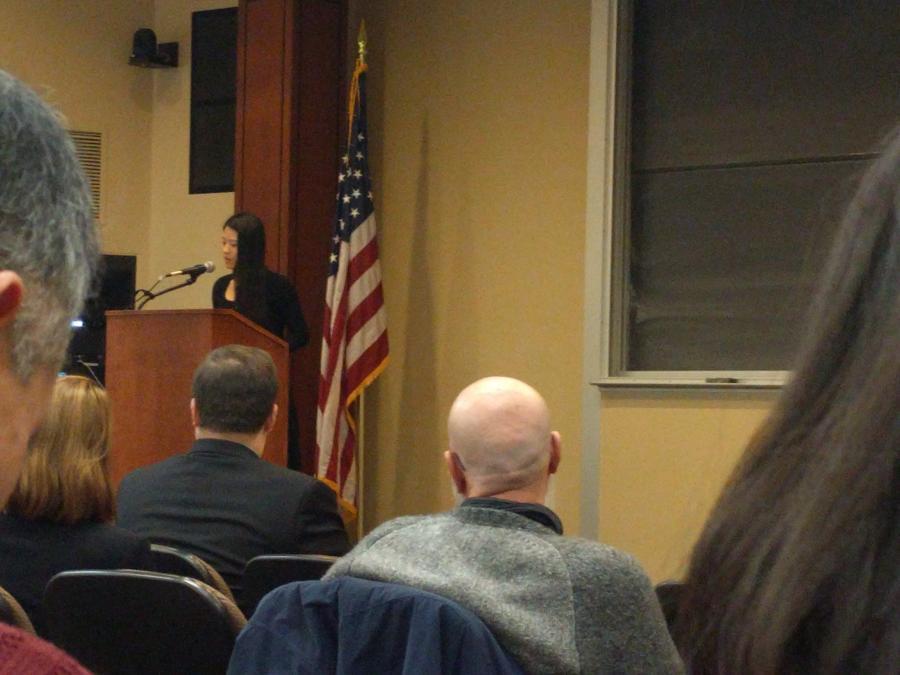
Grace Jo was born in North Korea, a country with human rights violations the United Nations has described as unparallelled in the contemporary world.
Jo was the keynote speaker at the grand opening of the new [Institute for Korean Studies](https://www.themaneater.com/stories/2017/2/2/new-mu-institute-korean-studies-one-first-nation/), a research institution on campus.
Jo was born into a large family, with two younger brothers and two sisters. As a child, she almost starved to death, and her two younger brothers died of starvation. Her father left the country to find food for the family, but was reported by a fellow villager as a result of the extensive surveillance system North Korea has in place.
“As a citizen we cannot trust anyone in the village,” Jo said during a question-and-answer session at the opening. “It seems like they are very close, but in reality we are not able to speak detailed thoughts to each other. That’s the reality in North Korea, and I think that’s what happened to my father as well.”
Her father was imprisoned for his crime, tortured and never returned. She said her sister also left the country to search for food and never returned. Jo said she was probably sold into sex slavery.
As a child, Jo, her mother and sister walked for three days to get to China, but she was repatriated twice and imprisoned. In the question-and-answer section, she spoke of the prison conditions.
“We had to sit up straight all day except for meal time and bathroom time,” Jo said. “They are not allowed to move even a second. They have certain position, they have to sit straight up, and that’s very hard to keep even 30 minutes, but you have to sit [like that] all day long. They will give you about 10 minutes break every four hours or five hours, when the guard switches.”
The event had a focus on the status of refugees, and IKS co-founder Harrison Kim referenced Italian philosopher Giorgio Agamben in his introduction of Jo.
“Agamben considers refugees as the central figure in modern political history because the refugee embodies the most serious contradiction of the nation-state, the contradiction that human rights are given only to citizens,” Kim said.
Jo’s experiences seem to validate Agamben’s theory.
“They’re all human beings — they all have a right to live, like a human being,” Jo said in an interview. “But because they have a different type of government in North Korea, they are dying, starving, and they are living in fear every day. Not many countries are surviving like that in this century.”
Jo teared up when asked about the moment she became a U.S. citizen in 2014, and she said she finally gained a sense of belonging.
“I think about all those lives and adventures we’ve been through with our family and I think finally, I belong to somewhere,” Jo said. “I belong to this country.”
North Korean defectors struggle to find refuge in the international system.
“North Korean defectors are international orphans,” Jo said. “Their country is ignoring them. And when we bring our hope to China, the Chinese government is completely ignoring us.”
According to Jo, only 214 North Korean refugees have been allowed to enter the U.S. in the last 10 years.
“I hope American politicians will allow North Korean defectors to enter the United States and live like human beings,” Jo said.
Jo hopes that the IKS can help refugees like herself by spreading knowledge and awareness.
“I think learning and educating the young generations is very important, because not many young people realize about this Korean peninsula issue,” Jo said in an interview. “I really hope this institute can be a big influence on college students about North Korean human rights.”
Jong-Kook Lee, Consulate General of the Republic of Korea in Chicago, traveled to MU to speak at the opening. He sees hope in the newly-formed IKS.
“I hope IKS of the University of Missouri will play a pivotal role to better the standing [of] Korea as a leading research center in the U.S.,” Lee said in a speech. “Furthermore, I expect IKS to be essential in strengthening Korea-U.S. relations.”
_Edited by Kyle LaHucik | [email protected]_